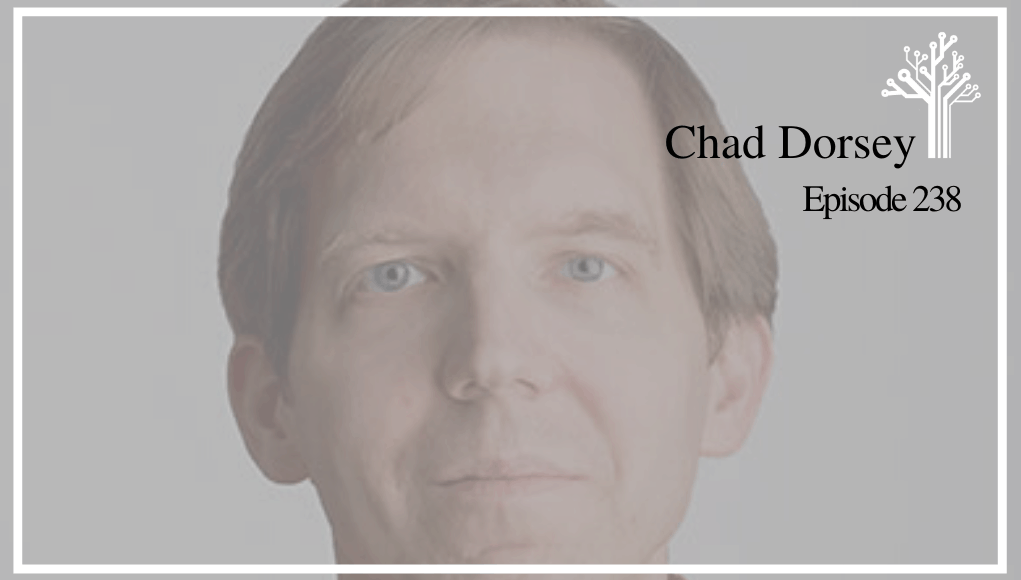Podcast: Chad Dorsey on Modeling and Data Science in STEM Education

Chad Dorsey grew up a science geek. He loved the lakes and meadows of summer camp. He studied physics in college and did doctoral work in geophysics at Oregon. He taught science in Maine and Vermont before taking on the leadership of the Concord Consortium. For more than a decade Chad has been leading their effort to use tech to transform STEM education by empowering learning to ask and answer their own questions.
With some help from NSF grants, Concord has built out a set of tools that help transform how science, math, and engineering are taught.
Focus areas include:
- Tools for inquiry: probes and sensors that bring the internet of things to life by encouraging students to ask and answer questions about the world around them.
- STEM simulations: Molecular Workbench is a set of modular interactive simulations that bring electrostatics, phase change, plasma, proteins, and quantum mechanics to life. Students can explore heredity and genetics by breeding virtual dragons. GEODE is creating a way to visualize the Earth’s movements using an interactive, dynamic computer model of tectonic plates. Students can also build dynamic models of complex systems.
- Data Science: Common Online Data Analysis Platform (CODAP) is an intuitive graphing and data analysis platform that takes the outputs from the system dynamics models, as well as any other validating data source, and blends them into a single analytic environment. The InSPECT project forges new directions in science learning by integrating novel technologies and computational thinking practices into curricular activities that allow high school students to undertake authentic and independent science investigations in biology using the CODAP engine.
- Engineering: the Energy2D and Energy3D CAD tools provide interactive simulations and visualizations of energy, allowing students to design and build energy-efficient scale-model houses.
The Math Kids Need
“The experience most students have in math is mostly dry, uninspired, not related to the real world,” said Dorsey. “They are not learning the math people use today.”
Dorsey would like to see more student-oriented, problem-based, and group-based math learning.
“We need more tools for collaborative classrooms,” said Dorsey. “And teachers need dashboards of real-time data so they can orchestrate problem-solving conversations.”
“The idea that calculus is king started in the Sputnik era but today everybody uses data. It’s critical that we rethink math pathways– calculus doesn’t need to be on top,” said Dorsey.
In place of route symbol manipulation, Dorsey would like to see more math modeling where students develop algebraic reasoning while grappling with complex problems.
Students should be active agents of discovery working together to uncover knowledge through project-based and problem- based learning using active tools.
Teaching this way takes a new sense of vulnerability, a willingness to say, “I don’t know,” explained Dorsey. “But it can be a purely invigorating thing for a teacher to lead a collaborative, inquiry-based classroom,” explained Dorsey
Dorsey said teachers need on-ramps to this new data-rich approach to collaborative problem solving and modeling. Visiting model schools and classrooms can be helpful–video can be a useful proxy. Sharing student work can be powerful. Starting with a 40 minute less is a good place to start.
After 25 years of work that often felt theoretical, Dorsey is pleased to see the broad adoption of next-generation STEM learning and seeing the world “coming in Concord’s direction.”
Key Takeaways:
[1:11] What made Chad a science geek?
[1:55] Why did Chad choose to study physics in college?
[2:25] How did Chad end up in Oregon?
[2:58] What originally drew Chad to geophysics?
[4:17] How did Chad get a job in Vermont teaching?
[5:02] What interested Chad about the role of leading the Concord Consortium?
[9:12] Chad speaks about one of their many focus areas at the Concord Consortium: tools for inquiry.
[11:55] Chad elaborates on why a simulation like the molecular workbench is so important.
[13:07] How’re the Concord’s simulations similar to or different from the PhET sims from CU?
[14:20] Chad speaks about their fun engine that explores heredity and genetics by breeding virtual dragons!
[15:05] Why is it important for secondary students to dive into modeling?
[18:00] Chad speaks about their data platform, CODAP, a Common Online Data Analysis Platform, and explains what students use it for.
[24:00] How does math fit into STEM education? And what does Chad believe we should be doing less and more of in education regarding it?
[28:20] Why are we still teaching math using the same old pathway (i.e. memorizing a set of rules and formulas)? And is there a better way to organize a secondary math sequence?
[33:32] Chad describes what STEM education should actually look like for students.
[37:23] Chad gives his ideas and thoughts on how to help teachers be successful in this new environment approach to teaching.
[38:58] Are school and classroom visits beneficial for teachers that are trying to implement big changes in instruction?
[40:50] Is Chad seeing lots of uptake on the tools that Concord is sharing? And is he optimistic about the future?
Mentioned in This Episode:
Chad Dorsey
The Concord Consortium
PhET Simulations from the University of Colorado Boulder
CODAP
For more, see:
- The Value of a STEM/Humanities Partnership
- The Superhero Schools of Philadelphia
- LEAP Innovations 2020 Framework
Stay in-the-know with innovations in learning by signing up for the weekly Smart Update.








0 Comments
Leave a Comment
Your email address will not be published. All fields are required.